大学生英语听力自我培养学习策略研究
英语听力自主学习策略培养研究
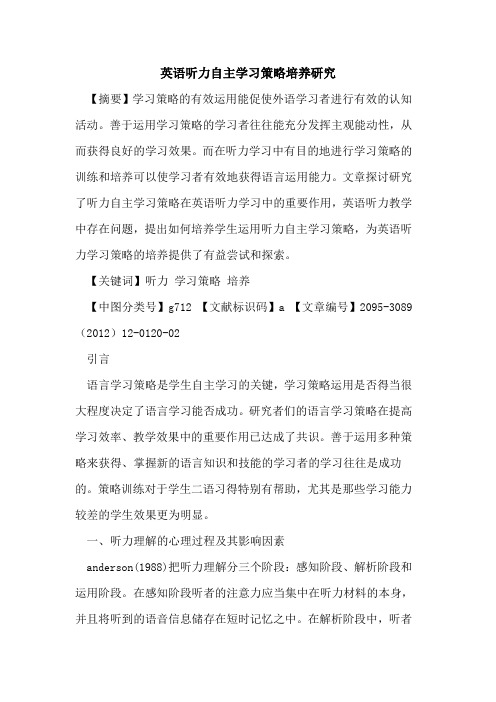
英语听力自主学习策略培养研究【摘要】学习策略的有效运用能促使外语学习者进行有效的认知活动。
善于运用学习策略的学习者往往能充分发挥主观能动性,从而获得良好的学习效果。
而在听力学习中有目的地进行学习策略的训练和培养可以使学习者有效地获得语言运用能力。
文章探讨研究了听力自主学习策略在英语听力学习中的重要作用,英语听力教学中存在问题,提出如何培养学生运用听力自主学习策略,为英语听力学习策略的培养提供了有益尝试和探索。
【关键词】听力学习策略培养【中图分类号】g712 【文献标识码】a 【文章编号】2095-3089(2012)12-0120-02引言语言学习策略是学生自主学习的关键,学习策略运用是否得当很大程度决定了语言学习能否成功。
研究者们的语言学习策略在提高学习效率、教学效果中的重要作用已达成了共识。
善于运用多种策略来获得、掌握新的语言知识和技能的学习者的学习往往是成功的。
策略训练对于学生二语习得特别有帮助,尤其是那些学习能力较差的学生效果更为明显。
一、听力理解的心理过程及其影响因素anderson(1988)把听力理解分三个阶段:感知阶段、解析阶段和运用阶段。
在感知阶段听者的注意力应当集中在听力材料的本身,并且将听到的语音信息储存在短时记忆之中。
在解析阶段中,听者通过解析将短时记忆中的语音信息划分成单词、短语、从句或者是其它的语言单位。
在运用阶段,听者借助已有知识,将大脑中的心理表征与已有的知识联系起来,从而对听力材料做出正确理解。
听力理解是一个复杂的心理认知过程,它需要对传递的信息进行加工分析、联想、预测和推断,是说话者、听力材料及听话者等多种因素相互影响的结果。
听力理解是复杂的心理过程,影响听力的原因也是多方面的。
可以划分为主观因素和客观因素。
主观因素侧重于听者,是与听话者直接相关的因素,客观因素是指听者的外在因素,倾向于语言本身,是被动接受的。
二、学习策略在英语听力自主学习中的重要作用鲁宾和汤普森(rubin&thompson, 1996)进行了为时两年的听力策略融合式教学试验。
大学英语听力自主学习能力的培养研究
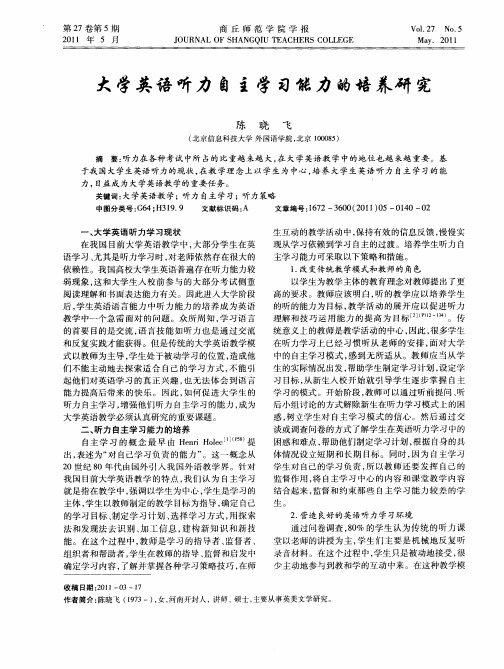
2 1 年 5 月 01
商 丘 师 范 学 院 学 报
J U N L O HA G I E C E SC L E E O R A FS N Q U T A H R O L G
Vo _ 7 No. l2 5
Ma . 2 1 v 01
大学英 语听力 自主学 习能力 的培 养研 究
在 听力 学 习上 已经 习惯 听从 老 师 的 安排 , 对 大学 面 中的 自主学 习模 式 , 到无 所 适 从 。教 师 应 当从 学 感 生 的实 际情 况 出发 , 帮助学 生制 定学 习计 划 , 定学 设 习 目标 , 新生人 校 开 始 就 引 导学 生 逐 步 掌 握 自主 从 学 习的模式 。开始 阶段 , 师 可 以通 过 听前提 问 、 教 听
后小组 讨论 的方 式解 除新 生在 听力 学 习模 式 上 的困
惑, 树立 学 生对 自主 学 习模 式 的信 心 。然 后 通 过交 谈 或 调查 问卷 的方式 了解 学生 在英 语听 力学 习 中的
困惑和难点, 帮助他们制定学习计划 , 根据 自身的具 体情况 设立 短期 和长 期 目标 。 同时 , 因为 自主 学 习 学生对 自己 的学 习 负 责 , 以教 师还 要 发 挥 自己的 所 监督作 用 , 自主 学 习 中心 的 内 容 和课 堂 教 学 内容 将 结合起 来 , 监督 和 约束 那 些 自主 学 习能 力 较 差 的学
出, 表述 为“ 自己学 习负 责 的能 力 ” 对 。这 一 概念 从 2 0世 纪 8 0年代 由国外 引 入我 国外 语教 学 界 。针 对
我 国 目前 大学英 语 教 学 的特 点 , 们认 为 自主学 习 我 就是指 在 教学 中 , 强调 以学 生为 中心 , 学生 是学 习 的
大学英语听力教学中的策略与方法

大学英语听力教学中的策略与方法引言大学英语听力是培养学生口语和交际能力的重要一环。
然而,由于听力技巧的复杂性和难度以及语言认知等因素的影响,很多学生在这方面遇到了困难。
为了有效提升大学英语听力教学质量,本文将介绍一些策略和方法。
1. 听前准备在进行听力训练之前,学生需要进行适当的准备工作,包括:- 预览主题内容:通过阅读与主题相关的材料、查阅词汇表以及掌握基本背景信息来增强理解能力。
- 注重文化背景:了解与目标语言相关的文化背景有助于提高对话或讲座中涉及到的文化现象、习惯等内容的理解。
2. 听觉辨别能力训练为了正确理解听力材料中的各个单词、短语和句子,学生需要不断提高他们的听觉辨别能力。
一些有效方法包括:- 练习音标:通过系统地学习和练习音标,加深对不同音素的辨识能力。
- 听音练习:通过听外语材料,特别是容易产生歧义的单词和短语,提高学生对语音差异的敏感度。
3. 笔记抓重点在听力过程中进行笔记记录有助于加强记忆和整理思维。
以下是一些值得注意的技巧: - 记录关键词和核心观点:及时抓住讲话者的主要论点、观点以及重点信息,便于后续回顾。
- 使用符号和缩写:采用简洁明了的符号和缩写方式,提高速度和效率。
4. 多样化听力材料为了培养学生应对多种听力场景的能力,多样化听力材料至关重要。
以下是一些建议: - 使用真实材料:包括新闻、广播、电影等日常生活中常见的听力内容,使学生更好地适应真实环境。
- 教师示范录音:引入教师示范录音来模仿日常会话场景,以提高学生对口语表达和操纵流畅度的理解。
5. 反馈和评估为了确保学生能够有效地掌握听力技巧,反馈和评估是不可或缺的。
- 听后练习:通过听后练习测试学生对听力材料的理解程度,并及时给予反馈。
- 学生自我评估:鼓励学生自行评估自己在听力方面存在的困难,并提供相应的帮助和建议。
结论大学英语听力教学中采用合适的策略和方法,能够有效提升学生的听力技巧、口语流利度以及对外语文化的理解。
自主学习模式下的大学英语听力学习策略研究

自主学习模式下的大学英语听力学习策略研究摘要:听力是当前大学生英语学习的薄弱环节。
论文提出了一些对我国大学英语听力教学非常实用的学习策略,以促进在自主学习模式下二语学习者的语言能力,提高教学者的教学水平。
关键词:大学英语;自主学习;听力过程;学习策略在日常交际中,“听”是一个极其重要的不可缺少的环节。
现行大学英语教学更加重视听说能力培养,因此,大力提高学生听力技能势在必行。
然而,在现行的听力教学以“自主学习为主,教师指导为辅”的背景和趋势下,听力训练主要交由学生自己进行,即“自主学习”,就是对自己学习的控制,包括目标、进展和评估的控制[1]。
很多同学对如何进行听力训练很茫然,而教师也往往运用传统的教学思维和方法指导学生,缺乏合适的理论指导,再者,听的过程显性程度低,很难把握,导致学生对听力技能的提高没有信心。
鉴于此,笔者对听力学习策略进行了深入的研究,希望对学习者和教师有所裨益。
一听力过程一般认为,听力理解过程包括自上而下和自下而上2种过程[2]。
自上而下的过程涉及头脑中已有的信息。
所谓自上而下指的就是从情景中获取线索,将听到的内容与头脑中已有的信息和知识形成连接。
情景线索来自于特定的情景,如说话者、话题、文本的目的、当时的场景、社会、文化背景知识等等,它们通常又被称为图式知识,是人们所遇到的情景的原型知识(stereotypical knowledge),是一个人已经获得的知识和经验在大脑中的集结,是人们用已有的知识结构来记住新信息的一种方法,是一种长时记忆中所留存的有关各个话题的思维框架。
由于人脑的长时记忆中留存有大量的知识摹本(script),听者往往能预测到听力材料中所描述的系列活动。
在听力实践教学中,我们发现听力好的学生除了语言基础知识扎实之外,还很好地运用了头脑中已有的知识或信息,在听力过程中,他们激活并运用图式知识,推断出言语的目的,尽力使听力理解与说话者的意图结合起来。
如:I went to the dentist this morning. He gave me an injection and I didn’t feel a thing. (今天上午我去看牙医,他给我打了一针,我一点儿也感觉不到疼了。
英语听力教学中的策略研究
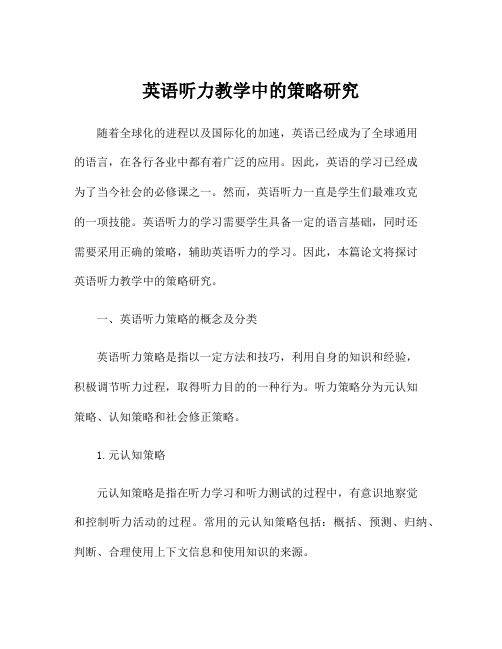
英语听力教学中的策略研究随着全球化的进程以及国际化的加速,英语已经成为了全球通用的语言,在各行各业中都有着广泛的应用。
因此,英语的学习已经成为了当今社会的必修课之一。
然而,英语听力一直是学生们最难攻克的一项技能。
英语听力的学习需要学生具备一定的语言基础,同时还需要采用正确的策略,辅助英语听力的学习。
因此,本篇论文将探讨英语听力教学中的策略研究。
一、英语听力策略的概念及分类英语听力策略是指以一定方法和技巧,利用自身的知识和经验,积极调节听力过程,取得听力目的的一种行为。
听力策略分为元认知策略、认知策略和社会修正策略。
1.元认知策略元认知策略是指在听力学习和听力测试的过程中,有意识地察觉和控制听力活动的过程。
常用的元认知策略包括:概括、预测、归纳、判断、合理使用上下文信息和使用知识的来源。
2.认知策略认知策略旨在帮助学习者能够根据听到的声音自主理解和分析出发言者的意图和对话内容。
常用的认知策略包括:抓住重点信息、听取过渡信息、找出上下文关系、利用非语言信息、猜测意思、转化为个人知识。
3.社会修正策略社会修正策略是在交际中发现和纠正不当举止,修正补救的策略。
常用的社会修正策略包括:感谢对方的修正、证实对方的意思和使用高级语言等。
二、英语听力策略在教学中的实践为了让学生掌握英语听力技能,教师需要在教学中注重培养学生的听力策略。
1.元认知策略的培养元认知策略是学习英语听力的基础,通过解决问题的方法,开发和增强学生的元认知策略,提高他们的听力水平。
教师可以通过问问题,让学生提高听力的效率并发挥利用现有知识的能力。
例如老师可以问:“你在听英语时使用了什么方法?它们是如何帮助你得出正确的答案的?2.认知策略的培养在培养学生的认知策略方面,教师可以为学生提供一些以不同的方式呈现的信息,并鼓励学生在实践中寻找和使用不同的认知策略,以找出区别和调节他们的听力过程中使用的策略。
例如老师可以提供多样的听力材料来培养学生的抓主旨能力。
英语专业学生听力自我效能感听力策略

英语专业学生听力自我效能感听力策略
英语专业学生听力自我效能感听力策略
近十年来,学习自我效能和学习策略已成为中外学者研究的热点课题,并取得了重要结果,主要认为学生的学习自我效能感、学习策略与学习成就之间存在着密切的相关关系。
A.Bandura认为,自我效能是指个体对其能否实施某一行为的能力的推测或判断,它主要通过个体经验、替代经验、言语劝说和情绪唤醒四个信息源形成;自我效能水平的高低影响个体对任务的`选择、付出的努力,以及在困难条件下对活动的坚持性。
Zimmerman & Martinez Pons的研究表明自我效能感与学生的学习成就息息相关,而且自我效能感与学生的组织、评价、计划、目标设置、控制等学习自我监控行为都呈现出显著正相关。
学习策略是指学习者在学习活动中有效学习的规则、方法、技巧及其调控,既可是内隐的规则系统,又可是外显的程序与步骤。
国内外学者的研究指出:学习策略作为学会学习的重要手段,对学习者的学习成绩有重要影响。
但纵观与自我效能、学习策略相关的文献,探讨自我效能与学习策略之间关系的研究并不多见。
针对英语专业学生的听力自我效能、听力策略、与听力成绩之间关系的研究更是鲜见报道。
浅析英语听说能力自我培养之策略-模板
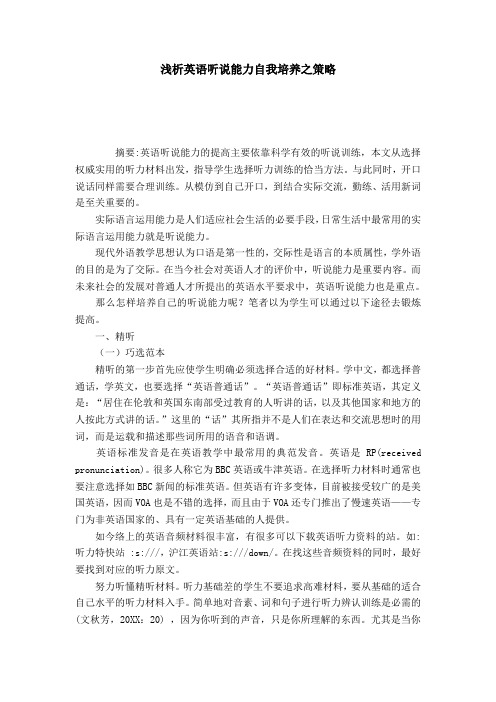
浅析英语听说能力自我培养之策略摘要:英语听说能力的提高主要依靠科学有效的听说训练,本文从选择权威实用的听力材料出发,指导学生选择听力训练的恰当方法。
与此同时,开口说话同样需要合理训练。
从模仿到自己开口,到结合实际交流,勤练、活用新词是至关重要的。
实际语言运用能力是人们适应社会生活的必要手段,日常生活中最常用的实际语言运用能力就是听说能力。
现代外语教学思想认为口语是第一性的,交际性是语言的本质属性,学外语的目的是为了交际。
在当今社会对英语人才的评价中,听说能力是重要内容。
而未来社会的发展对普通人才所提出的英语水平要求中,英语听说能力也是重点。
那么怎样培养自己的听说能力呢?笔者以为学生可以通过以下途径去锻炼提高。
一、精听(一)巧选范本精听的第一步首先应使学生明确必须选择合适的好材料。
学中文,都选择普通话,学英文,也要选择“英语普通话”。
“英语普通话”即标准英语,其定义是:“居住在伦敦和英国东南部受过教育的人听讲的话,以及其他国家和地方的人按此方式讲的话。
”这里的“话”其所指并不是人们在表达和交流思想时的用词,而是运载和描述那些词所用的语音和语调。
英语标准发音是在英语教学中最常用的典范发音。
英语是RP(received pronunciation)。
很多人称它为BBC英语或牛津英语。
在选择听力材料时通常也要注意选择如BBC新闻的标准英语。
但英语有许多变体,目前被接受较广的是美国英语,因而VOA也是不错的选择,而且由于VOA还专门推出了慢速英语——专门为非英语国家的、具有一定英语基础的人提供。
如今络上的英语音频材料很丰富,有很多可以下载英语听力资料的站。
如:听力特快站 :s:///,沪江英语站:s:///down/。
在找这些音频资料的同时,最好要找到对应的听力原文。
努力听懂精听材料。
听力基础差的学生不要追求高难材料,要从基础的适合自己水平的听力材料入手。
简单地对音素、词和句子进行听力辨认训练是必需的(文秋芳,20XX:20) ,因为你听到的声音,只是你所理解的东西。
大学英语听力学习与自主学习策略
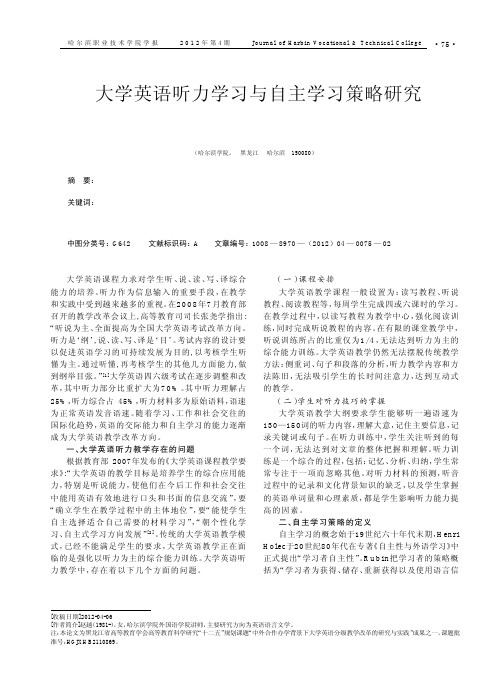
・75・ 哈尔滨职业技术学院学报 2012年第4期 J o urna l of Ha rbi n Vo c a t i ona l & T e c h ni c a l C ol l e ge大学英语课程力求对学生听、说、读、写、译综合能力的培养。
听力作为信息输入的重要手段,在教学和实践中受到越来越多的重视。
在2008年7月教育部召开的教学改革会议上,高等教育司司长张尧学指出:“听说为主、全面提高为全国大学英语考试改革方向。
听力是‘纲’,说、读、写、译是‘目’。
考试内容的设计要以促进英语学习的可持续发展为目的,以考核学生听懂为主。
通过听懂,再考核学生的其他几方面能力,做到纲举目张。
”[1]大学英语四六级考试在逐步调整和改革,其中听力部分比重扩大为70%。
其中听力理解占25%,听力综合占 45%,听力材料多为原始语料,语速为正常英语发音语速。
随着学习、工作和社会交往的国际化趋势,英语的交际能力和自主学习的能力逐渐成为大学英语教学改革方向。
一、大学英语听力教学存在的问题根据教育部 2007年发布的《大学英语课程教学要求》:“大学英语的教学目标是培养学生的综合应用能力,特别是听说能力,使他们在今后工作和社会交往中能用英语有效地进行口头和书面的信息交流”,要“确立学生在教学过程中的主体地位”,要“能使学生自主选择适合自己需要的材料学习”,“朝个性化学习、自主式学习方向发展”[2]。
传统的大学英语教学模式,已经不能满足学生的要求,大学英语教学正在面临的是强化以听力为主的综合能力训练。
大学英语听力教学中,存在着以下几个方面的问题。
[收稿日期]2012-04-06[作者简介]赵越(1981-),女,哈尔滨学院外国语学院讲师,主要研究方向为英语语言文学。
注:本论文为黑龙江省高等教育学会高等教育科学研究“十二五”规划课题“中外合作办学背景下大学英语分级教学改革的研究与实践”成果之一。
课题批准号:HGJXH B2110869。
谈谈大学生英语听力自主学习的策略和方法
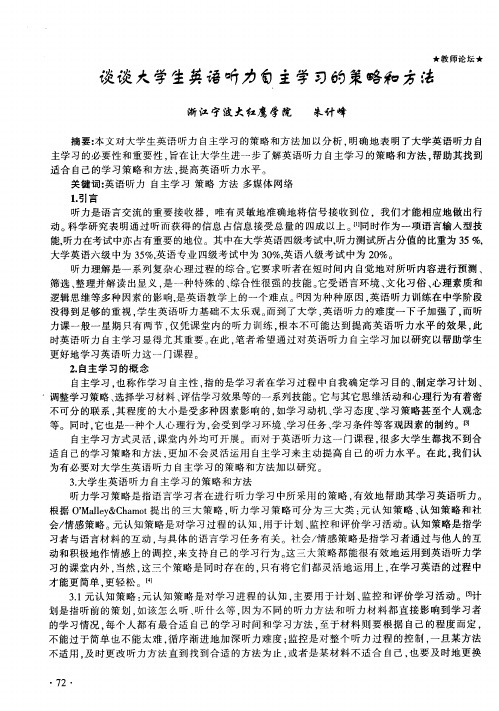
才能更 简单 , 轻松 。[ 更 4 1 31 . 元认 知策 略 : 认知 策 略是对 学 习进 程 的认 知 , 元 主要用 于计 划 、 监控 和评 价学 习活动 。[ 5 1 计 划是 指听前 的策划 , 该怎 么听 、 如 听什 么等 , 因为 不 同的听力方 法 和听 力材 料 都直 接影 响到学 习者 的学 习情况 , 每个 人都 有最合 适 自己的学 习时间 和学 习方法 , 至于 材料 则要 根 据 自己的程度 而定 , 不能过 于简单 也不 能 太难 . 序 渐进地 加深 听力难 度 ; 控是对 整个 听力过 程 的控 制 , 循 监 一旦某 方法
★教 师论 坛 ★
谈谈 天学生莫语口力 白主学 习的策略和 方法 f j 『
浙江宁波大红鹰学院 朱计 峰
摘 要: 本文对 大学 生英语 听力 自主学 习的策略 和方法加 以 分析 , 明确 地表 明 了大学英 语听力 自 主学 习的必 要性 和重要性 , 旨在让大学 生进一 步 了解英 语听力 自主学 习 的策略 和方法 , 帮助其找 到
适 合 自己的学 习策 略和方 法 , 高英语 听力水 平 。 提 关键词 : 英语 听力 自主学习 策略 方法 多接 收器 ,唯有灵敏地 准确地将 信号 接收到 位 ,我们 才能相应 地做 出行 动。 科学研 究表 明通过 听而获得 的信 息 占信息 接受 总量的 四成 以上 。 同 时作为 一项语 言输入型技 Ⅲ 能, 听力在考试 中亦 占有重要 的地位 。其 中在大学英语 四级考试 中, 听力测试所 占分值的 比重为 3 5%,
没得 到足够 的重视 , 生英语 听 力基 础不 太乐观 。 学 而到 了大 学 , 英语 听力 的难 度一 下子加 强 了, 而听
力课 一般一 星期 只有两 节 , 仅凭课 堂 内的听 力训练 , 根本 不可 能达 到提 高英 语 听力水 平 的效果 , 此 时英语 听力 自主学习显 得尤 其重要 。 在此 , 者希望 通过对英 语 听力 自主学 习加 以研 究 以帮助学生 笔 更好地 学习英语 听力这 一 门课 程 。 2自主学 习的概 念 . 自主学 习 。 也称 作学 习 自主性 , 的是学 习者在学 习过程 中 自我 确定 学 习 目的、 指 制定 学 习计 划 、 调整学习策略 、 选择学 习材料 、 评估学 习效果等的一系列技能 。它与其它思 维活动和 心理行 为有着密 不可分 的联 系 , 程度 的大小是 受多 种 因素影 响 的, 学习动 机 、 习态度 、 习策略甚 至个人 观念 其 如 学 学 等。同时 , 它也是一种个 人心理行 为 , 受到学习环境 、 习任务 、 习条件 等客观 因素 的制约 。1 会 学 学 3 ] 自主学 习方式 灵活 , 堂 内外均 可开展 。而对于 英语听力 这一 门课程 , 多大学生 都找不 到合 课 很 适 自己的学 习策 略和方法 , 加不会 灵活运用 自主学 习来主动 提高 自己的听力水 平 。在此 , 更 我们认 为有必要对 大学生 英语 听力 自主学 习的策略 和方法加 以研究 。 3大学生英 语听力 自主学习 的策略和 方法 . 听力学 习策略 是指语 言学 习者在进 行听 力学 习中所 采用 的策略 , 有效 地帮 助其学 习英语听力 。 根据 0 M l y C a t 出的三 大策 略 , ’ al & h mo 提 e 听力学 习策 略可 分 为三 大类 : 认 知策 略 、 知策 略和社 元 认 会/ 情感策 略。 认知策 略是对 学 习过程 的认 知 , 于计划 、 元 用 监控和 评价学 习 活动 。 认知 策略是指 学 习者与语言材 料的互 动 . 与具体 的语言 学习任务 有关 。社会 / 情感 策 略是指 学 习者通过 与他人 的互 动 和积极地作情 感上 的调控 , 来支 持 自己的学 习行 为 。 三大 策略都能 很有 效地 运用到 英语听力学 这 习的课 堂 内外 . 当然 , 这三个 策略是 同 时存 在 的 , 只有将它们 都灵 活地 运用 上 , 学习英语 的过程 中 在
学习策略训练与大学英语听力自主学习
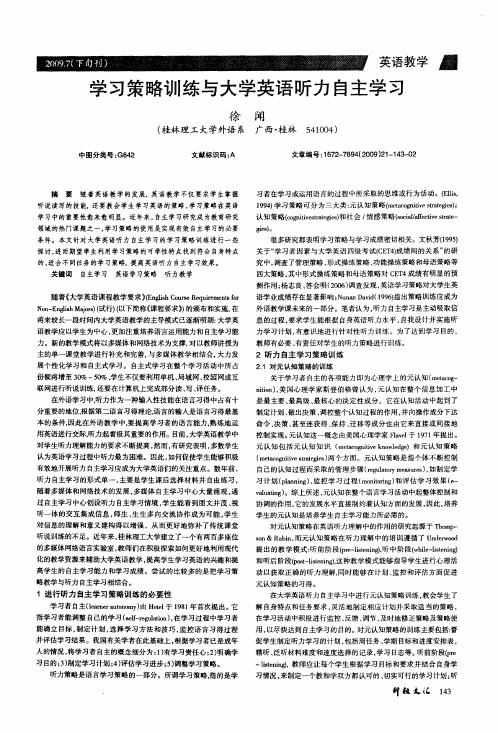
学 习策略训练与大学英语听力 自主学 习
徐 闻
( 林理工 大 学外语 系 广西 ・ 林 桂 桂
中图分类号 : 4 G8 2 文献标识码 : A
510 ) 4 0 4
文章编号 :6 2 7 9 ( 0 9 2 — 4 - 2 1 7 — 8 4 2 0 )1 1 3 0
力 。新的教学模式将以多媒体和网络技术为支撑, 对以教师讲授为
主的单一课 堂教学进行补充和完善, 与多媒体教学相结合, 大力 发 展个性化学习和 自主式学 习。自主式学 习在整个学 习活 动中所 占 份额将增至 3 %~5 %, 0 0 学生不仅要利用单机 、 局域网 、 校园网或互
2 听 力 自主 学 习 策 略训 练
过 自主学习 中心创设听力 自主学习情境 , 学生能看到 图文并茂 、 视
协调 的作用 , 它的发展水平直接制约着认知方面的发展 , 因此, 培养
学生的元认知是培养学生 自主学习能力所必需 的。 对元认 知策略在英语 听力理解 中的作用的研究起源于 T o p hm —
sn R bn 而 元 认 知 策 略 在 听力 理 解 中 的 培训 遵 循 了 U drod o & u i, n ewo
分重要 的地位, 根据第二语言习得理论, 语言的输 入是语言习得最基 本的条件, 因此在外语教学 中, 提高学习者的语言能力, 要 熟练地运
是 最主要 、 最高级 、 最核心 的决定性成分 。它在认知活动 中起到 了 制定计划 、 做出决策 、 调控整个认 知过程的作用 , 向操作成分下达 并 命令 、 策, 决 甚至连获得 、 保持 、 迁Байду номын сангаас等成分也 由它来直接或间接地
21对 元 认 知 策 略 的训 练 .
网络化大学英语听力自主学习策略探究
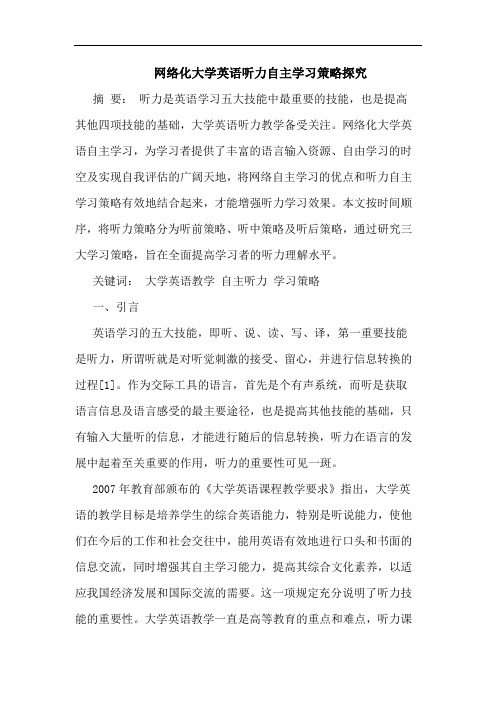
网络化大学英语听力自主学习策略探究摘要:听力是英语学习五大技能中最重要的技能,也是提高其他四项技能的基础,大学英语听力教学备受关注。
网络化大学英语自主学习,为学习者提供了丰富的语言输入资源、自由学习的时空及实现自我评估的广阔天地,将网络自主学习的优点和听力自主学习策略有效地结合起来,才能增强听力学习效果。
本文按时间顺序,将听力策略分为听前策略、听中策略及听后策略,通过研究三大学习策略,旨在全面提高学习者的听力理解水平。
关键词:大学英语教学自主听力学习策略一、引言英语学习的五大技能,即听、说、读、写、译,第一重要技能是听力,所谓听就是对听觉刺激的接受、留心,并进行信息转换的过程[1]。
作为交际工具的语言,首先是个有声系统,而听是获取语言信息及语言感受的最主要途径,也是提高其他技能的基础,只有输入大量听的信息,才能进行随后的信息转换,听力在语言的发展中起着至关重要的作用,听力的重要性可见一斑。
2007年教育部颁布的《大学英语课程教学要求》指出,大学英语的教学目标是培养学生的综合英语能力,特别是听说能力,使他们在今后的工作和社会交往中,能用英语有效地进行口头和书面的信息交流,同时增强其自主学习能力,提高其综合文化素养,以适应我国经济发展和国际交流的需要。
这一项规定充分说明了听力技能的重要性。
大学英语教学一直是高等教育的重点和难点,听力课的教学质量直接影响到学生语言知识的接收和用英语进行交际的能力及水平,但纵观大学英语听力教学的效果并不尽如人意。
因此,怎样有效提高大学生的英语听力理解能力并应用到大学英语教学中,是我们研究的重要课题。
二、网络化大学英语自主听力的优点大学英语教学改革,特别是网络化大学英语自主听力的改革,如一缕春风刮遍了大江南北的大学校园,为英语学习者提供了广阔的学习平台和提高听力水平的空间,展现了现代技术强大的力量。
网络化大学英语自主听力的主要优点如下:1.网络平台促进英语学习网络自学平台的建设对学校在教室、电脑等方面都提了较高的要求,并且需要学生掌握基本的操作技能,传统的听力教学形式单一,教师控制主机终端,学生们被动接受相同的听力材料,相同的上课进程,相同的教学方法,学生缺乏自我选择权,而学生的水平参差不齐,每个学生的学习需求不能得到充分的满足,会出现好学生吃不饱,后进学生消化不了的两极分化现象,教学效果欠佳。
大学生英语听力自我培养学习策略研究
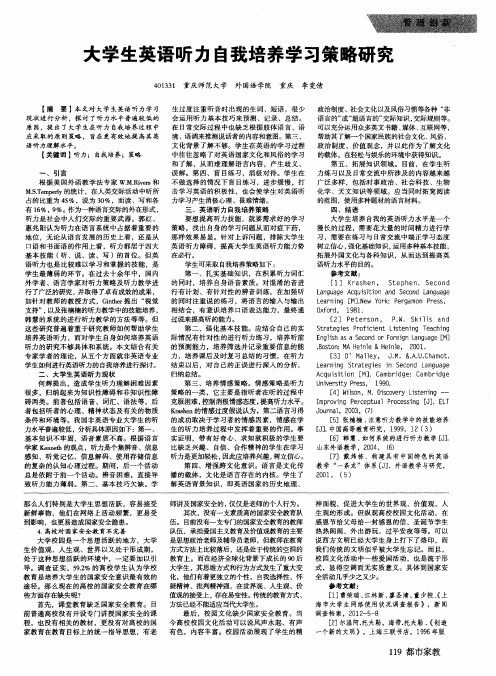
英语专业大一新生听力自主学习之策略研究
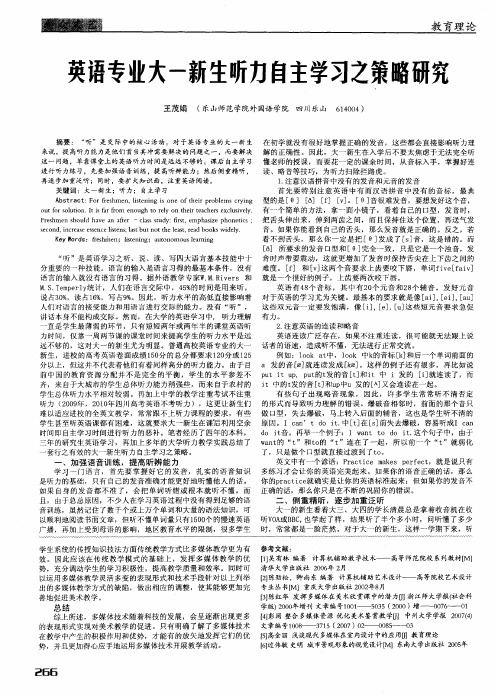
读 、略音 等技 巧 ,为听力 扫除 拦路 虎 。 1注 意汉语 拼音 中没 有的 发音和 元音 的发 音 . 首 先要 特 别 注 意 英 语 中 有 而 汉语 拼音 中没 有 的音 标 ,最 典 型 的是 [ 0] [] [] [] [ 音很难 发音 ,要想发好 这个 音 , 6 f v 。 0]
进行 听力练 习,先要 加强语 音动i ,提 高听辨能力 ;然后侧重精听 , 练 再 逐 步 加 重 泛 听 ; 同 时 ,要 扩 大 知 识 面 , 注 重英 语 阅读 。 关键词 :大一新 生;听力 ;自主学习
Ab t a t:F r fe h e src o r s m n,l t ni g i o f t i r b e wi i e n s ne o her p o l ms c ng s
F ehme h ul v n at r —ca s s d :f s,e rs n s o d ha e a f e ls t y i t mph sz ho e is; u r ai e p n t c
s c n , n r ae es nc se s ls u o h at r a o k d l . e o d i c e s se el tn ; atb tn t el s, e d b o swi ey i t e
教 育理 论
英语专业大一新生听力自 主学习之策略研究
王茂娟 ( 乐山师范学院外 国语学院 四川 乐山 6 4 0 10 4)
大学英语听力自主学习的策略研究
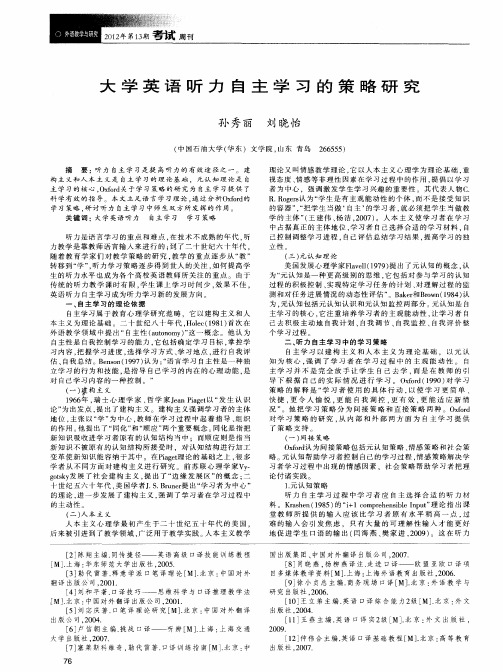
理 论 又 叫情感 教 学 理 论 , 以人 本 主 义 心 理 学 为 理 论 基 础 . 它 重 视 态 度 、 感 等 非 理 性 因素 在 学 习 过 程 中 的作 用 , 倡 以 学 习 情 提 者 为 中心 ,强 调 激 发 学 生 学 习兴 趣 的重 要 性 。其 代 表 人 物 C . R R g r认 为 “ . o es 学生 是有 主 观 能动 性 的个 体 . 不 是 接 受 知 识 而 的容 器 ” “ 学 生 当做 ‘ ,把 自主 ’ 的学 习者 , 必 须 把 学 生 当 做 教 就 学 的 主 体 ” 王 建 伟 、 洁 ,0 7 。 人 本 主 义使 学 习 者 在 学 习 ( 杨 20 )
■墨
大 学 英 语 听 力 自 主 学 习 的 策 略 研 究
孙 秀 丽 刘 晓怡
( 国石 油 大 学 ( 东 ) 文 学 院 , 东 青 岛 中 华 山 摘 要 : 力 自主 学 习是 提 高 听 力 的 有 效 途 径 之 一 。 建 听 构 主 义和 人 本 主 义 是 自主 学 习的 理论 基 础 .元 认 知 理 论 是 自 主 学 习的 核 心 . xod 于 学 习 策略 的 研 究 为 自主 学 习提 供 了 O fr 论 , 过 分 析O fr 的 通 xod 学 习 策略 , 讨 听 力 自主 学 习 中师 生 双 方所 发 挥 的 作 用 。 研 26 5 ) 6 5 5
关 键 词 : 学 英语 听 力 自主 学 习 学 习策 略 大 听 力是 语 言 学 习 的 重 点 和难 点 , 技 术 不 成 熟 的年 代 , 在 听 力 教 学 是 靠 教 师语 言输 入 来 进 行 的 ; 了二 十 世 纪 六 十 年 代 , 到 随着 教 育 学 家 们 对 教 学 策 略 的研 究 , 学 的 重 点 逐 步 从 “ ” 教 教 转 移 到 “ ” 听力 学 习策 略 逐 步 得 到 世 人 的关 注 , 何 提 高学 学 , 如 生 的听 力 水 平 也 成 为各 个 高 校英 语 教 师 所 关 注 的重 点 。 由 于 传 统 的 听 力 教 学 课 时 有 限 , 生 课 上 学 习 时 间少 , 果 不 佳 , 学 效 英 语 听力 自主 学 习 成 为 听力 学 习 新 的 发 展方 向 。
谈大学生英语听力自主学习的策略和方法
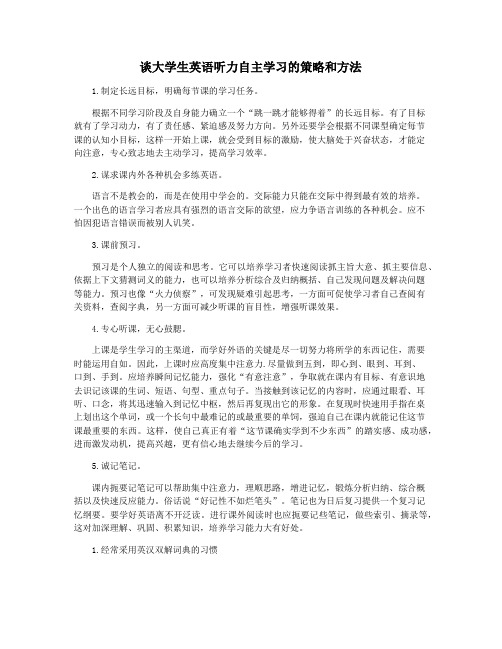
谈大学生英语听力自主学习的策略和方法1.制定长远目标,明确每节课的学习任务。
根据不同学习阶段及自身能力确立一个“跳一跳才能够得着”的长远目标。
有了目标就有了学习动力,有了责任感、紧迫感及努力方向。
另外还要学会根据不同课型确定每节课的认知小目标,这样一开始上课,就会受到目标的激励,使大脑处于兴奋状态,才能定向注意,专心致志地去主动学习,提高学习效率。
2.谋求课内外各种机会多练英语。
语言不是教会的,而是在使用中学会的。
交际能力只能在交际中得到最有效的培养。
一个出色的语言学习者应具有强烈的语言交际的欲望,应力争语言训练的各种机会。
应不怕因犯语言错误而被别人讥笑。
3.课前预习。
预习是个人独立的阅读和思考。
它可以培养学习者快速阅读抓主旨大意、抓主要信息、依据上下文猜测词义的能力,也可以培养分析综合及归纳概括、自己发现问题及解决问题等能力。
预习也像“火力侦察”,可发现疑难引起思考,一方面可促使学习者自己查阅有关资料,查阅字典,另一方面可减少听课的盲目性,增强听课效果。
4.专心听课,无心鼓腮。
上课是学生学习的主渠道,而学好外语的关键是尽一切努力将所学的东西记住,需要时能运用自如。
因此,上课时应高度集中注意力.尽量做到五到,即心到、眼到、耳到、口到、手到。
应培养瞬间记忆能力,强化“有意注意”,争取就在课内有目标、有意识地去识记该课的生词、短语、句型、重点句子。
当接触到该记忆的内容时,应通过眼看、耳听、口念,将其迅速输入到记忆中枢,然后再复现出它的形象。
在复现时快速用手指在桌上划出这个单词,或一个长句中最难记的或最重要的单饲,强迫自己在课内就能记住这节课最重要的东西。
这样,使自己真正有着“这节课确实学到不少东西”的踏实感、成功感,进而激发动机,提高兴越,更有信心地去继续今后的学习。
5.诚记笔记。
课内扼要记笔记可以帮助集中注意力,理顺思路,增进记忆,锻炼分析归纳、综合概括以及快速反应能力。
俗话说“好记性不如烂笔头”。
大学英语课外听力自学策略研究

大 学 英语 课 外 听 力 自学策 略研 究
马 爱凤
( 山东理工大学外国语 学院 山东・ 淄博
中图分类号 : 4 G6 2 文献标识码 : 8
254 ) 509 4( 0 9) 4 1 2 0
摘 要 随着 我国的对外交往 的增 多, 国家和社会对大学生的 英语综合应用能力 , 尤其是 听说 能力 , 出了更高和更迫切的要求。 提 在英语的听、 读 、 译 等多项技 能中, 说、 写、 听的技 能是基础。但是听 力学 习仅仅 靠大学课 堂每周 的一两个 学时的听力课是远远不够 的。 结合 自己 学经验 , 出了大学英语听力课 外 自学的学习策略。 教 提 关键词 大学英语 课外听力 自学 策 略 随着我 国的社会和经济迅 猛发展 , 国际交 流 日益频繁 , 国家 和 社会对大学英语教学 , 大学生的英语综合应用 能力 , 对 尤其是听说 能力 , 出了更高和更迫切 的要求 。在英语 的昕 、 、 写、 提 说 读、 译等 多 项技能 中, 的技 能是基础 , 听 也是关键 。特别 是在 四 、 六级考试 中, 听力理解 占有很 高的分值。因此提高听力理解能力 , 无论是对于在 校大学 生的四 、 级考试 , 六 还是 日常交际需 要来说 , 都是 至关重要 的。语言学 习的规律表 明 : 提高听力必须花费 大量时间 , 英语听力 的提高需要量的积累 , 不花大量时间不可 能有 突破 。因此听力的提 高仅靠每周一两个学时的听力课是无法实现的。因此 , 学生必须加 强课外听力 自学的同时讲 求策略。 在作者的教学 中很多同学提出 : 如何提高英语 听力?为什么平 日 英语听力提高总是不见效果?如何 听 , 听什么材料等等一系列 有 关听力的问题。为什么出现这些情况呢 , 症结在 哪里? 多年 的教学 实践表 明 : 主要症结在 于很多同学的英语发音 、 词 汇、 词组 、 习语 、 文化思维以及学习习惯等还没过关 。也就是说很多 英语最基础 的东西很多同学还没过关 。要 想帮助学生克服 这些 困 难, 就必须在听力 自学 中采取一些应对措施。 第一 , 自身准确的发音。 自身准确地道 的英语发音不能让你在 听力 上面无往不利 ,但是不准确不地 道的发音绝对不能有 效的解 决听力 问题 。而准确地道的发音往往 叉得 之于在听力 中纠正 自己 的发音, 两者是互相进行 的。把发音和听力一起练, 两者不分家 。具 体 地说 就是 : 光听完 了英语还不行 , 把听到 的一切英语 声音都 还要 尽量原模原样地从嘴里模仿 出来 。那 种 “ 发音 准不准无所谓、 发音 地道不地道无所谓 、 能说英语 就行 ”的错误观点绝对要不得。要练 习英语听力就必须练习地道准 确的英 语发音 ,如果你 的英语发音 不地 道准确, 你反过来能分辨和 听懂别人 地道准确 的英语发音 吗? 假设 我们 的发音能做到和外 国人 的发音完全~样 , 能听懂 自己 你 的发 音,就一定能够听懂外国人 的声音。E gs ekr nlh pa e 一般是用 i s “ 底气” 发音 , 多数 中国人 只用 口腔发 音 , 出来 的话 味道差别 而 说 很 大。因此 , 找一盘发音纯 正的英语 磁带 , 反复 、 认真地模仿 , 每天 训 练 12 — 小时, 到 3 内声音条件 会有大的变化。听力学习同其 2 周 他 内容一样 , 一定要从基础抓起 , 尤其 是语音 的矫正 与辨 别不容忽 视。只有从基础 的语音人手 , 步过渡到单词 、 逐 短语 、 句子、 对话和 语 篇, 才能真正起到提高听力 的作用 。 第二 , 坚持采用精 听与高质量 的泛听相结合的方式。课外 听力 自学也存 在精泛听结合 的问题 。精 听是指在完整地 昕全文的基础 上 , 复地听 , 反 将听音 内容句句落实 。不但听懂每个单 词, 而且听懂 整个 篇章。在精听练习 中, 常采用 的方法就是快速记录。精 听的材 料不宜过难 。精听的好处是能使学生熟悉听力材料 中关键词 、 高频 词的读音、 用法及常用句型 , 养他 们对这些词 的快 速反应能力和 培 用英语思维 的能力 。精听需选择一种适合你的程度 的 , 有一定权威 性 的听力教材 , 精听每 部分 内容 , 做所有 练习题 , 明白里 面的每 搞 个部 分。同时 , 找一种好 的听力材料 , 重复听 , 直到听的不能再熟 为止 。仅仅依靠精听来提高学生的听力水平 是不够 的, 还必须增加 听力材料 的数量 , 也就是泛听 。泛听的 目的是巩 固和扩大精听 的成 果, 接触更多 的语言现象 , 更快提高听觉反应能力。泛 听的量要大 , 内容要广 , 不必句句都听懂 , 了解大意就行。例如, 可以通过观看原
大学生英语听力自主学习的策略培养研究
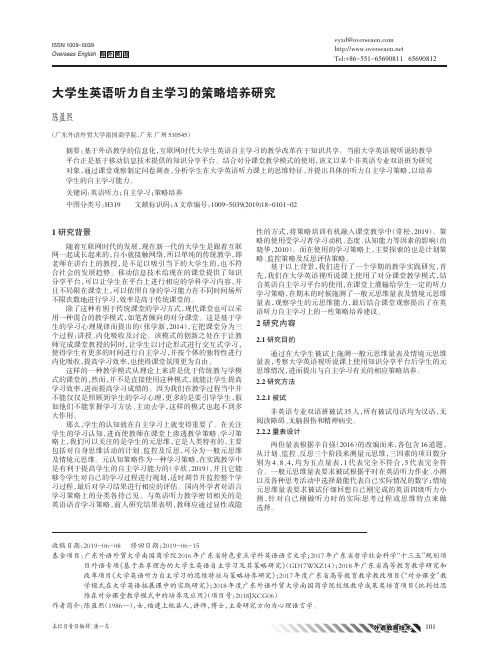
一一一一一一一外语教育技术本栏目责任编辑:唐一东大学生英语听力自主学习的策略培养研究陈盈熙(广东外语外贸大学南国商学院,广东广州510545)摘要:基于外语教学的信息化,互联网时代大学生英语自主学习的教学改革在于知识共享。
当前大学英语视听说的教学平台正是基于移动信息技术提供的知识分享平台。
结合对分课堂教学模式的使用,该文以某个非英语专业双语班为研究对象,通过课堂观察制定问卷调查,分析学生在大学英语听力课上的思维特征,并提出具体的听力自主学习策略,以培养学生的自主学习能力。
关键词:英语听力;自主学习;策略培养中图分类号:H319文献标识码:A 文章编号:1009-5039(2019)18-0101-021研究背景随着互联网时代的发展,现在新一代的大学生是跟着互联网一起成长起来的,自小就接触网络,所以单纯的传统教学,即老师在讲台上的教授,是不足以吸引当下的大学生的,也不符合社会的发展趋势。
移动信息技术给现在的课堂提供了知识分享平台,可以让学生在平台上进行相应的学科学习内容,并且不局限在课堂上,可以依照自身的学习能力在不同时间场所不限次数地进行学习,效率是高于传统课堂的。
除了这种有别于传统课堂的学习方式,现代课堂也可以采用一种混合的教学模式,如笔者倾向的对分课堂。
这是基于学生的学习心理规律而提出的(张学新,2014),它把课堂分为三个过程:讲授、内化吸收及讨论。
该模式的创新之处在于让教师完成课堂教授的同时,让学生以讨论形式进行交互式学习,使得学生有更多的时间进行自主学习,并按个体的独特性进行内化吸收,提高学习效率,也使得课堂氛围更为自由。
这样的一种教学模式从理论上来讲是优于传统教与学模式的课堂的,然而,并不是直接使用这种模式,就能让学生提高学习效率,进而提高学习成绩的。
因为我们在教学过程当中并不能仅仅是照顾到学生的学习心理,更多的是要引导学生,假如他们不能掌握学习方法、主动去学,这样的模式也起不到多大作用。
英语听力策略研究与学习者自主性培养
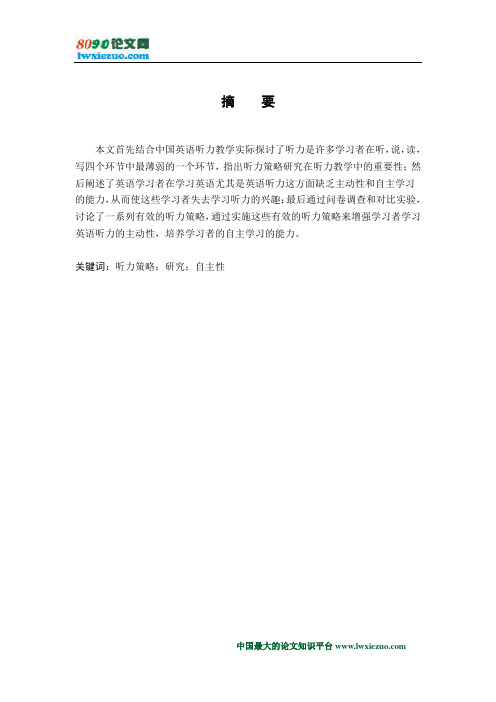
摘要本文首先结合中国英语听力教学实际探讨了听力是许多学习者在听,说,读,写四个环节中最薄弱的一个环节,指出听力策略研究在听力教学中的重要性;然后阐述了英语学习者在学习英语尤其是英语听力这方面缺乏主动性和自主学习的能力,从而使这些学习者失去学习听力的兴趣;最后通过问卷调查和对比实验,讨论了一系列有效的听力策略,通过实施这些有效的听力策略来增强学习者学习英语听力的主动性,培养学习者的自主学习的能力。
关键词:听力策略;研究;自主性ABSTRACTThis paper first explores that listening is the weakest link in the four links which are listening, speaking, reading and writing in the context of English listening teaching in China, and points out the importance of studying listening strategies in listening teaching. It then elaborates that the learners lack autonomy and the ability of autonomous learning while learning English especially English listening, and thus makes the learners lose interests of learning listening. It finally discusses a series of effective listening strategies through questionnaire and a comparative experiment. Through implementing these effective strategies, it can help enhance learner autonomy and foster the ability of autonomous learning while learning English listening.Key words:listening strategies; research; autonomyContents1.Introduction (51)2. Study of English listening strategies review (52)2.1 Definition of learning strategies and its research methods (52)2.2 Relation between listening strategies and fostering autonomy (54)2.3 Research of listening strategies (56)3. Research on autonomous learning of English listening (61)3.1 Definition of autonomous learning (61)3.2 Theoretical basis of autonomous learning (62)3.3 Present situation and causes of autonomous learning (62)3.4 Ways to foster learner autonomy (63)4. Research and experimental study (66)4.1 Basic introduction of questionnaire (66)4.2 Targeted experiment (66)5.Conclusion (71)Acknowledgements (72)References (73)1.IntroductionEnglish listening is an important but relatively weak link in English teaching. Old teaching models, boring listening materials, shortage of language and culture information and poor listening skills all have some influence on English listening. With the development of the global economy, the status of English as an international language is further recognized, so the ability of input becomes more important. For English, the process of input is just the process of listening which has always been a difficult process for almost English learners, so the study of listening strategies has emerged in recent decades. Many researchers have proposed a series of useful strategies through their study such as self-management, language skill training, and listening skills and so on.Combined with previous studies, some new strategies are put forward in this paper and at the same time, there is another purpose in writing this paper. It is to foster learner autonomy through these strategies. We hope that learners can have interest in English listening while using these strategies, turning passive learning into active learning. And gradually they will develop a habit of autonomous learning. Through this process, learners will no longer feel listening is a difficult study.In this article, we mainly use questionnaire and experiment to further explain the strategies used in listening. At the same time, it also analyzes the present situation and the problems the learners come across when they are doing listening. Then it puts forward a series of acceptable and feasible strategies. For example, the learners who like enjoying foreign soundtrack movies or television programs can learn through switching the subtitles. First, they can enjoy the movie with subtitles, and then enjoy again without subtitles. The purpose is to let them understand the meaning through just listening and watching video. Practice makes perfect. We believe this kind of practice will improve learners‟listening. Moreover, it can also increase the interest in listening. Second, taking notes in listening is very essential. Effective notes can strengthen listeners‟memory and achieve a multiplier effect.2. Study of English listening strategies reviewStudy has proved that in modern communication, listening has accounted for 45% and stayed in the first place, speaking 30%, reading 16%, writing 9% [1]133. Listening plays an important role in English teaching. Since 1990s, many foreign researchers have begun to be concerned about the listening strategies. In our country, the study of English listening strategies stepped into the early stages of development in 1990s and at the end of 1990s, it stepped into a rapid development. Indeed, as the increase in the number of the research, people gradually recognize the importance of listening. However, how to enhance the capacity of listening is a rather difficult problem for researchers and teachers. After 1970s, psychology and education sectors recognize the significance of learning strategies. Using effective learning strategies not only can improve study to a large degree, but also can enhance learning outcome and quality, reduce learning burden.2.1 Definition of learning strategies and its research methodsTo study English listening strategies, we must first refer to learning strategies because listening strategies are important part of learning strategies. The researches on learning strategies are much earlier than listening strategies and its research methods are much systematic than the methods of listening strategies. Thus more materials and details to study listening strategies should be given to the researchers. The study of learning strategies began in 1970s. In 1975, Rubin opened the prelude to discuss language learning strategies in a paper entitled “What the Good Learner Can Teach Us”. In the next 30 years, the study of learning strategies has made considerable progress both in breadth and depth and the exploration points cover all aspects of research. Because of different classifications, there are various kinds of definitions.2.1.1 Definition of learning strategiesSeveral well-known foreign researchers put listening strategies into three categories: Meta-cognitive strategies, Cognitive strategies, Social and affective strategies [2]149. Meta-cognitive strategies belong to higher levels and help learners manage their learning. The strategies include the process of learning, learning programs formulation, monitoring and assessing the results generated from finishing learning tasks. Cognitive strategies are closely related to learning materials. The strategies are adopted by learners to identify, understand, maintain and extract information more effectively. The strategies include material processing, the use of non-verbal information, association, memory, concluding, logical reasoning and so on. Social and affective strategies are for learners to ensure to transmit information and control their own emotions in the process of learning. The strategies mainly include fostering interest in learning consciously, building learning confidence, overcoming anxious and impatient emotions, taking advantage of all kinds of opportunities for real communication and seeking for help effectively.In China, Wen Qiufang classified language learning strategies into two kinds: management strategies and learning strategies. Learning strategies can be further divided into traditional and non-traditional strategies. Traditional strategies include training strategy, veracity strategy and relying on native-language strategy; non-traditional strategies include functional practice strategy, fluency strategy and avoiding native language strategy [3]105.2.1.2 Research on learning strategiesThe research on learning strategies began in the early 1970s. The initial study is mainly to find some characteristics of those excellent learners. The research focus began to turn to the relationship between learning strategies and the process of language learning and the cognitive process of information processing. The research on learning strategies generally focus on observing the role it plays in language learning as a whole. Researches find that effective learners differ from ineffective learners significantly in using learning strategies.The effective learners make good use of selective focus, meaning inferred from the context, background information for understanding.Language learning is a very complex social and psychological process. The selection of language materials, organization and input should be related to learning strategies. To some extent, learning strategies have a great impact on foreign language learning. Learning is purposeful. In order to achieve this goal, we must take some effective strategies.In addition, in today‟s world, science and technology get rapid development and information technology changes with each passing day. If today‟s students want to go through the intense competition after leaving school, they still need to keep on learning to supplement and update the knowledge. To resolve the conflicts between unlimited knowledge and limited time at school, we should implement quality education to enable students obtain the ability of lifelong learning. Quality education is a comprehensively developed education. The key points is focused on the sustainable development of students, therefore, to know how to learn for students is the inevitable demand of the times and the need to meet the economic and scientific challenges of 21st century.2.2 Relation between listening strategies and fostering autonomyTraining the ability of English listening and speaking is one of the main contents of English teaching, we must use some effective English listening strategies to promote the verbal levels of learners. The traditional English teaching methods focus only on teaching grammar and vocabulary, but ignore listening, speaking and speech sounds teaching and thus make students feel very difficult when doing listening comprehension. Gradually students lose confidence in listening comprehension and lack learner autonomy. The study of English listening strategies plays an important role in improving autonomous learning of listening.2.2.1 Research meaning of listening strategiesListening, speaking, reading and writing are four essential steps in Englishlearning. In the four key steps, listening is the first step. Teachers attach importance to information input and output of students in the process of English teaching. As we all know, listening is a process of input, so it is imperative to study English listening strategies.The function of language is for communication and the skill of listening is one important aspect of communicative competence. Listening is the core of communicative activity. Second, from language itself, if the learners have no ability of listening while learning a foreign language, their linguistic competence is not complete and directly affects actual exchange. At the same time, it also seriously hampers the development of other language skills. The importance of listening has become a consensus, so the research meaning of listening strategies is more profound.2.2.2 Research meaning of fostering learner autonomyComprehensive viewing the status of our foreign language education, the input of manpower and resource of foreign language teaching is much more than other countries, but the effect is not satisfactory. An important reason is that traditional foreign language education model focuses only on teaching, not learning. It unilaterally emphasizes on one–sided teaching, stresses uniqueness and standardization, neglects students as main part to learn and ignores individual difference and learners‟ initiative and creativity. A realistic situation is that in today‟s world the spread of knowledge and update of information are speeding up, students must have the ability of autonomous learning outside the classroom.As the main body of teaching activities, students are a very important link. The teaching is difficult to achieve the desired effect without fostering and improving learner autonomy. English teaching practice shows that too much reliance on the teacher will affect learners to develop the ability of learner autonomy and the quality of foreign language teaching. In this more complex input process, the mental calm is particular important, so students should strengthen the training of mind in the process of listening [4]1202.3 Research of listening strategiesMary Underwood [5]6proposed three stages of teaching listening: pre-listening, while-listening, post-listening. Teachers should be based on the characteristics of listening materials combined with the reality, try to deal with the relationship of the three links, make good use of the teaching strategies. The pre-listening means the strategies used before listening. That is to help students find out the key points and difficult points. While-listening means the strategies used in listening. Teachers should train the students to concentrate on the main parts, select important information and get necessary information quickly. Post-listening means the strategies used after listening. The purpose is to help students self-examine and self-improve. Post-listening is a process to find out the mistake and correct it. Teachers can encourage students to record some difficult points from English listening so as to gather experience.Giving students systematic training and guidance of listening strategies are important means to improve students‟ verbal level and the ability of autonomous learning and further study. This paper has put forward a series of listening strategies such as making predictions, note-taking, inferencing, memorizing better, improving pronunciation and intonation and so on. Through listening practicing, learning, training and mastering these useful listening strategies, students can gradually build a good listening habit and do more practice and autonomous learning at usual time.2.3.1 Making PredictionsIn our real communication, we usually predict what other people will say in the following communication. In listening training and testing, learning how to make predictions will help us understand the contents we will listen. We can make sensible and reasonable predictions according to different known information such as titles, options, contents we have just heard, signal words or phrases and so on. Developing the habit of predicting will improve accuracy and the speed of understanding.For example: predicting what the text might be about according to keyvocabulary.Key words and expressions: eclipse, chaser, flock, anticipation, mount, tout, solar, block, be armed with, witness, spectacle, astronomy, shadow, mystifying, addicted, plunge, scramble, satellite map, instinct.Step oneDirections: Read the key words and expressions given above and answer the following questions.1. What will the following passage probably be about according to the key vocabulary?2. What expression related to eclipse can you think of?Step twoDirections: listen to the passage twice and answer the following questions.1.How long will the moon block the sun?2.What cities will the eclipse plunge into darkness?3.What are people doing in response to the weather forecasts in shanghai?Step threeSelf-monitoring1.Can I usually make predictions about what I am going to hear according the key words and phrases given?2.Can I use the key words and phrases to form a meaningful paragraph/passage/conversation?Students are good at using the known information and language content to judge the unknown information quickly. This can greatly improve the efficiency of listening. Because listeners will do a series of job such as prediction, screening, interpretation and summarizing in the process of listening. The technique is very important in examination.2.3.2 Note-takingTaking notes is an important strategy we need to develop while listening. Note-taking does not mean to write down every word, but to record the important information that can help us understand the content. We can change our emphasis or ways according to different themes of the articles. Learners canbe trained to express re-phrases; identify key or main points; identify semantic markers; make an outline; identify some words about time and order; record abbreviation and symbol and so on. In the process of listening, students receive information, but also analyze and summarize the information they have just heard. They will forget the content they have just heard quickly, so they should cultivate the habit of doing record or take notes. The students had better drawn up some marks to help memory and recall. Due to time constraints, notes should be simple, practical and clear. Gradually enabling students to combine words with ideas and understanding the article comprehensively and concretely.2.3.3 InferencingIn real communication, people will express themselves with euphemistical ways. We usually need to inference the speaker‟s implications or real purpose via all kinds of relative information. For example, the change of speaker‟s intonation pattern; local context clues; discourse context clues; linguistic clues and choice of words such as commendatory terms, derogatory terms and neuters; collocation; usage; signal words or phrases; special syntactic clues; the status of speaker. If we can pay attention to these kinds of information and make inference in listening training, we will definitely improve our listening.For example, the learners are trained to make inferences by means of linguistic clues (choice of words) and discourse context clues. They will be given some new words and expression: concrete, the Royal Family, recession, raid, piggy bank, tab, stir, Buckingham Palace, hoopla, zoom, the Union Jack, fiscal year, equivalent, the Duke of Edinburgh, clip. And then let them listen to a news report twice, paying particular attention to the speaker‟s choice of words and discourse context clues, and answer the following questions.1. What does the speaker really mean by …they are not immune to the global recession‟ in the beginning of the report?2. Why do you think the report‟s cameraman laughed at …Buck House‟?3. What does …raising eyebrows‟ mean?After the listening, we also require the learners to monitor themselves by asking themselves …Do all the ways I have learnt here to make inferences help me with my listening comprehension? What other ways do I know?‟2.3.4 Memorizing BetterThe learners will always complain that they seem to understand the content while listening, but when they answer the question, they seem to forget everything, so they attribute it to their bad memory. In fact, it is a kind of illusion. The key problem lies in listening methods or habit not memory. When we listen to the paragraph, long dialogue or sentence, the key point is to understand and remember the important information not every words. Therefore, the selective attention and memory become significant in listening. Furthermore, these kinds of skills can be trained and built gradually.2.3.5 Improving pronunciation and intonationIn the process of listening, the basis of listening is to distinguish different sound of words. Teachers pay more attention to the development of the ability to distinguish the sound such as tonal, slur and so on. During the process, students will generate perceptual knowledge of English voice, tone and language flow. So strengthening the basic knowledge of voice training is of importance. For example:A: Sorry, I lost your notebook that you lent me yesterday. (↘)B: What? (↗)The rising tone here does not mean the speaker does not understand the meaning of the talk, but expresses the meaning of doubt and shock in the tone.A: Sorry, I lost your notebook that you lent me yesterday. (↘)B: So what? (↘)The falling tone of …so what‟ expresses it does not matter or I do not care.Reading after record for students is very useful. Imitating the pronunciation and intonation of native speakers can help learners. The correct pronunciation is the prerequisite and guarantees to distinguish sound. Teachers should make students be aware of the importance of correct pronunciation. In the first classes, teachers can help students correct their pronunciation errors and enhance the necessary knowledge of speech sound. Otherwise, if the learners makeconfusing of the Basic English sound, they will also make mistakes in the use of them. The article will analyze it in the fourth chapter. In the fourth chapter, there is a targeted experiment to explain it concretely.2.3.6 Strengthening grammar and vocabularyEnglish listening has high demand on grammar and vocabulary. But many English learners overlook the importance of grammar. For example:A: Where were you yesterday? You should have come to my home.B: Yes, if I had not been occupied by my work.Question: Where was the man yesterday?In this talk it is subjective mood. If learners fail to judge it or misunderstand, they will lose confidence. From this we can see good grammar can help them a lot.Learning English is like building a house and vocabulary is just the bricks. Knowing more new words can help understand the meaning of a talk or a context. When doing listening comprehension in TEM-4 test, many students can understand what it talks about, but they can not write it down and finally lose many points.Strengthening the training of grammar and vocabulary is helpful for learners. The training for basic knowledge is not enough in the classrooms. Practice after school is important and teachers should do a better job to detect and monitor students‟work. Many higher schools now are equipped with computer network platform and I believe it is a good tool to urge students for autonomous learning. In addition, the testing methods are not necessary dictation and word tutor.3. Research on autonomous learning of English listening 3.1 Definition of autonomous learningAutonomous learning, by definition, refers to the learning capabilities get into full play. It is also called self-assessment, independent learning, self-access, self-directed learning and learner-controlled instruction.The concept of autonomous learning at least has five aspects.1. Learners entirely rely on their own for study.2. They can use a set of learning skills in the process of study.3. A kind of ability that is inborn but restrained by the tedium and repetitive teaching methods.4. Learners should be responsible for their own study.5. The right that the learners determine their own learning goals [6]204.Holec [7]3 thinks that learner autonomy is a kind of ability that the learners are in charge of themselves. This ability can be gradually acquired from training. Specifically it includes five aspects: setting learning goals, determining the process of the content, selecting skill methods, monitoring learning process and evaluating learning effect.From the degree of autonomy, autonomous learning can be divided into Procative Autonomy and Reactive Autonomy [8]71. Procative Autonomy means that learners can manage their own learning, determine their own learning goals. Reactive Autonomy means to select the appropriate learning method to assess their learning process and results. Reactive Autonomy means that learners usually can not determine learning goals, but once they are determined, they will organize to learn towards the goals.3.2 Theoretical basis of autonomous learningAutonomous learning is based on cognitive psychology and humanistic psychology. It advocates learner gradually separate themselves from teachers and rely on them. Cognitive psychology believes the process of language learning is a process learner can take active part in. language learning task is to try to provide opportunities for students to communicate by using their existing knowledge. But humanistic psychologists emphasize on self-concept and emotional factors in the process of learning. They believe that language teaching should focus on meaningful communication, respect and attach importance to learners and consider study as a form of self-realization. Both theories emphasize on learner-centered in language learning.3.3 Present situation and causes of autonomous learningListening is complex perceptual cognitive process. In everyday English communication, only understand what they say, the exchange will produce. Theinformation obtained in the social activities, 75% of it is get from listening and speaking and 45% is listening. The level of listening has a direct impact on the overall ability to use their language. Although listening is an important language skill, the widespread phenomenon is that learning effect is less efficient and the ability of autonomous learning is weak. There are several main reasons for the present situation.Linguistic factors: The voice, vocabulary and grammar of the learners have an impact on the listening comprehension. Speech sound is the most basic element of language. For a non-native speaker, if he wishes to communicate with others with fluent English, his vocabulary should be 5000-10000 words. Grammar is the bone of language and permeates in all aspects such as listening, speaking, reading and writing.English curriculum and teaching strategies: For a long time, English teaching pay much attention to intensive reading not listening and speaking. This makes students overlook the importance of listening. The listening course is usually a kind of listening test. The steps are following: put tape or CD, the students complete the practice by referring to the text book, and then the teacher gives the right answers to the students. This repeated testing and inspection make class atmosphere depressing.3.4Ways to foster learner autonomyFostering learner autonomy is essential for English teaching. In this paper, it has put forward several ways to improve learner autonomy.The fixed position of teacherIn today‟s world, the roles of students and teachers have changed substantially. Autonomous learning requires learner-centered teaching. Wenden [9]515 thinks that in fact learners should be allowed to be their own teacher and take charge of teachers‟ responsibility, but most learners are not fully prepared. Teachers should let learners be ready to assume this new responsibility and help them know how to learn. The teacher‟s role has changed and they become the helper of the students. They provide methods, psychological preparation and timely advice. Ginther [10]133 investigated two kinds of visual support for the achievement of computerized TOEFL listening. One visual support was about background information and another one was about the content.Changes in teaching strategiesLimited classroom teaching is difficult to improve students‟ listening level in a short time. Lynch [11]257 trained the learners to pay more attention to the stress and tone while listening. Letting students take initiative to solve the problems in listening such as self-understanding of vocabulary, grammar and cultural background, teachers should be fully prepared for teaching content, do meticulous design for teaching links, provide all kinds of opportunities for students thinking actively.Study habitPreview and review after class are important part in learning and instructional improvement. Since students rarely do listening autonomously after class, teachers can provide students with effective listening materials, recommend world classic works such as films and television programs and other video materials in English, timely check their understanding of these materials, encourage students to speak to natives and take part in English corners so as to increase the interest in listening. In the post-listening stage, teachers should require students to review the content earnestly. First of all, when students come across the new subject matter in listening class, after class, the students can find the relevant materials for practicing. In the process of listening, learners can accumulate many new words and new expressions. In addition, students should adjust listening process and strategies.Use of internetMany high schools have English course online. According to the teaching requirements, teachers can arrange students submit listening practice in time and record the details of their learning. The teachers can leave a message in students‟QQ, E-mail or blog and give them some effective advice and encourage. In college English courses, students no longer rely on teachers to acquire knowledge. They can control their learning process according to their own learning style. If they come across any difficulties, they can seek for help online or find answers for themselves.Keeping a good state of mindIn this more complex input process, the mental calm is particular important, so students should strengthen the training of mind in the process of listening. Vandergrift [12]425 had also studied in this area. For example, enjoying。
- 1、下载文档前请自行甄别文档内容的完整性,平台不提供额外的编辑、内容补充、找答案等附加服务。
- 2、"仅部分预览"的文档,不可在线预览部分如存在完整性等问题,可反馈申请退款(可完整预览的文档不适用该条件!)。
- 3、如文档侵犯您的权益,请联系客服反馈,我们会尽快为您处理(人工客服工作时间:9:00-18:30)。
大学生英语听力自我培养学习策略研究
作者:李雯倩
来源:《都市家教·下半月》2013年第06期
【摘要】本文对大学生英语听力学习现状进行分析,探讨了听力水平普遍较低的原因,提出了大学生在听力自我培养过程中应采取的原则策略,旨在更有效地提高其英语听力理解水平。
【关键词】听力;自我培养;策略
一、引言
根据美国外语教学法专家W.M.Rivers和M.S.Temperly的统计,在人类交际活动中听所占的比重为45%,说为30%,而读、写和各有16%,9%。
作为一种语言交际的外在形式,听力是社会中人们交际的重要武器。
郭红、惠兆阳认为听力在语言系统中占据着重要的地位,无论从语言发展的历史上看,还是从口语和书面语的作用上看,听力都居于四大基本技能(听、说、读、写)的首位。
但英语听力也是比较难以学习和掌握的技能,是学生最薄弱的环节。
在过去十余年中,国内外学者、语言学家对听力策略及听力教学进行了广泛的研究,并取得了卓有成效的成果,如针对教师的教授方式,Ginther提出“视觉支持”,以及张楠楠的听力教学中的技能培养,韩慧的系统的进行听力教学的方法等等。
但这些研究普遍着重于研究教师如何帮助学生培养英语听力,而对学生自身如何培养英语听力的研究不够具体和系统。
本文结合有关专家学者的理论,从五个方面就非英语专业学生如何进行英语听力的自我培养进行探讨。
二、大学生英语听力现状
何辉提出,造成学生听力理解困难因素很多,归纳起来为知识性障碍和非知识性障碍两类。
前者包括语音、词汇、语法等,后者包括听者的心理、精神状态及有关的物质条件和环境等。
我国非英语专业大学生的听力水平普遍较低,分析具体原因如下:第一、基本知识不牢固,语音素质不高。
根据语言学家Kenneth的观点,听力是个集辨音、信息感知、听觉记忆、信息解码、使用存储信息的复杂的认知心理过程。
期间,后一个活动总是依附于前一个活动。
辨音困难,直接导致听力能力薄弱。
第二、基本技巧欠缺。
学生过度注重听音时出现的生词、短语,很少会运用听力基本技巧来预测、记录、总结。
在日常交际过程中也缺乏根据肢体语言、语境、语调来推测说话者的内容和意图。
第三、文化背景了解不够。
学生在英语的学习过程中往往忽略了对英语国家文化和风俗的学习和了解,从而难理解语言内容,产生歧义、误解。
第四、盲目练习,消极对待。
学生在不做选择的情况下盲目练习,进步缓慢,打击学习英语的积极性,也会使学生对英语听力学习产生消极心理、畏难情绪。
三、英语听力自我培养策略
要想提高听力技能,就要需求好的学习策略,找出自身的学习问题从而对症下药,那样效果易显。
针对上诉问题,排除大学生英语听力障碍,提高大学生英语听力能力势在必行。
学生可采取自我培养策略如下:
第一、扎实基础知识,在积累听力词汇的同时,培养自身语音素质。
对混淆的音进行有计划、有针对性的辨音训练,在加强听的同时注重说的练习,将语言的输入与输出相结合,有意识培养口语表达能力,最终通过说来提高听的能力。
第二、强化基本技能。
应结合自己的实际情况有针对性的进行听力练习,培养听前的预测能力,培养筛选并记录重要信息的能力,培养课后及时复习总结的习惯,在听力结束以后,对自己的正误进行深入的分析,归纳总结。
第三、培养情感策略。
情感策略是听力策略的一类,它主要是指听者在听的过程中克服困难,控制消极情感态度,提高听力水平。
Krashen的情感过度假说认为,第二语言习得的成功取决于学习者的情感因素,情感在学生的听力培养过程中发挥着重要的作用。
事实证明,带有好奇心、求知欲积极的学生要比缺乏兴趣、自信、合作精神的学生在学习听力是更加轻松,因此应培养兴趣,树立信心。
第四、增强跨文化意识。
语言是文化传播的载体,文化是语言存在的内核。
学生了解英语背景知识,即英语国家的历史地理、政治制度、社会文化以及风俗习惯等各种“非语言的”或“超语言的”交际知识,交际规则等。
可以充分运用众多英文书籍、媒体、互联网等,帮助其了解一个国家民族的社会文化、风俗、政治制度、价值观念,并以此作为了解文化的载体,在轻松与娱乐的环境中获得知识。
第五、拓展知识领域。
目前,在学生听力练习以及日常交流中所涉及的内容越来越广泛多样,包括时事政治、社会科技、生物化学、天文知识等领域。
应当同时拓宽阅读的范围,使用多种题材的语言材料。
四、结语
大学生培养自我的英语听力水平是一个漫长的过程,需要花大量的时间精力进行学习,需要在练习与日常交流中端正学习态度树立信心,强化基础知识,运用多种基本技能,拓展外国文化与各科知识,从而达到提高英语听力水平的目的。
参考文献:
[1] Krashen, Stephen. Second Language Acquisition and Second Language Learning [M].New York: Pergamon Press, Oxford, 1981.
[2] Peterson, P.W. Skills and Strategies Proficient Listening Teaching English as a Second or Foreign Language [M] .Boston: MA Heinle & Heinle, 2001.
[3] O’Malley, J.M. &.A.U.Chamot. Learning Strategies in Second Language Acquisition [M]. Cambridge: Cambridge University Press, 1990.
[4] Wilson,M. Discovery Listening -- Improving Perceptual Processing [J]. ELT Journal,2003,(7)
[5] 张楠楠.注意听力教学中的技能培养[J].中国高等教育研究,1999,12(3)
[6] 韩慧.如何系统的进行听力教学[J].山东外语教学,2004,(6)
[7] 戴炜栋.构建具有中国特色的英语教学“一条龙”体系[J].外语教学与研究,2001,(5)。
